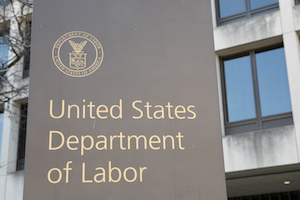 A March 10 announcement by the Department of Labor’s Employee Benefits Security Administration provides a precursor to the direction it plans to take on the recently finalized rules.
A March 10 announcement by the Department of Labor’s Employee Benefits Security Administration provides a precursor to the direction it plans to take on the recently finalized rules.
Released as an enforcement policy statement under Title I of ERISA, the DOL advised that it will not enforce the final rules on Financial Factors in Selecting Plan Investments and Fiduciary Duties Regarding Proxy Voting and Shareholder Rights.
“Until the publication of further guidance, the department will not enforce either final rule or otherwise pursue enforcement actions against any plan fiduciary based on a failure to comply with those final rules with respect to an investment, including a Qualified Default Investment Alternative, or investment course of action or with respect to an exercise of shareholder rights,” the DOL said in the announcement.
“These rules have created a perception that fiduciaries are at risk if they include any environmental, social and governance factors in the financial evaluation of plan investments, and that they may need to have special justifications for even ordinary exercises of shareholder rights,” said Principal Deputy Assistant Secretary for the Employee Benefits Security Administration Ali Khawar. “We intend to conduct significantly more stakeholder outreach to determine how to craft rules that better recognize the important role that environmental, social and governance integration can play in the evaluation and management of plan investments, while continuing to uphold fundamental fiduciary obligations.”
On Nov. 13, 2020, the DOL under the Trump administration published a final rule on Financial Factors in Selecting Plan Investments, which adopted amendments to the “Investment Duties” regulation under Title I of ERISA. The changes stepped away from using the terms environmental, social and governance (ESG) factors, but instead generally require plan fiduciaries to select investments and investment courses of action based solely on consideration of “pecuniary factors.”
Then, on Dec. 16, 2020, the DOL published a final rule on Fiduciary Duties Regarding Proxy Voting and Shareholder Rights, which also adopted amendments to the Investment Duties regulation to address obligations of plan fiduciaries under ERISA when voting proxies and exercising other shareholder rights in connection with plan investments in shares of stock.
The DOL notes that it heard from a wide variety of stakeholders that have asked whether these two final rules properly reflect the scope of fiduciaries’ duties under ERISA to act prudently and solely in the interest of plan participants and beneficiaries.
Stakeholders have also questioned whether the department “rushed the rulemakings unnecessarily” and failed to adequately consider and address the substantial evidence submitted by public commenters on the use of ESG considerations in improving investment value and long-term investment returns for retirement investors, the DOL’s announcement further explains.
Moreover, the department notes that it has heard from stakeholders that the rules—and investor confusion about them—have already had a “chilling effect” on appropriate integration of ESG factors in investment decisions, including in circumstances that the rules may in fact allow.
Accordingly, the DOL says that it intends to “revisit” the rules. The DOL says that it will update the Employee Benefits Security Administration’s website as more information becomes available.
The DOL’s announcement was not unexpected, as President Biden in one of his first Executive Orders had directed a review of the ESG-less Financial Factors rule. In addition, Labor Secretary nominee Marty Walsh had indicated in written responses to his Senate confirmation hearing that he planned to revisit the ESG and proxy voting rules.
President Biden had also ordered a pause on all unpublished rules, but since these rules had been published in the Federal Register and had become effective, the administration will likely have to go through the formal notice and comment period under the Administrative Procedures Act to revise them.
- Log in to post comments
